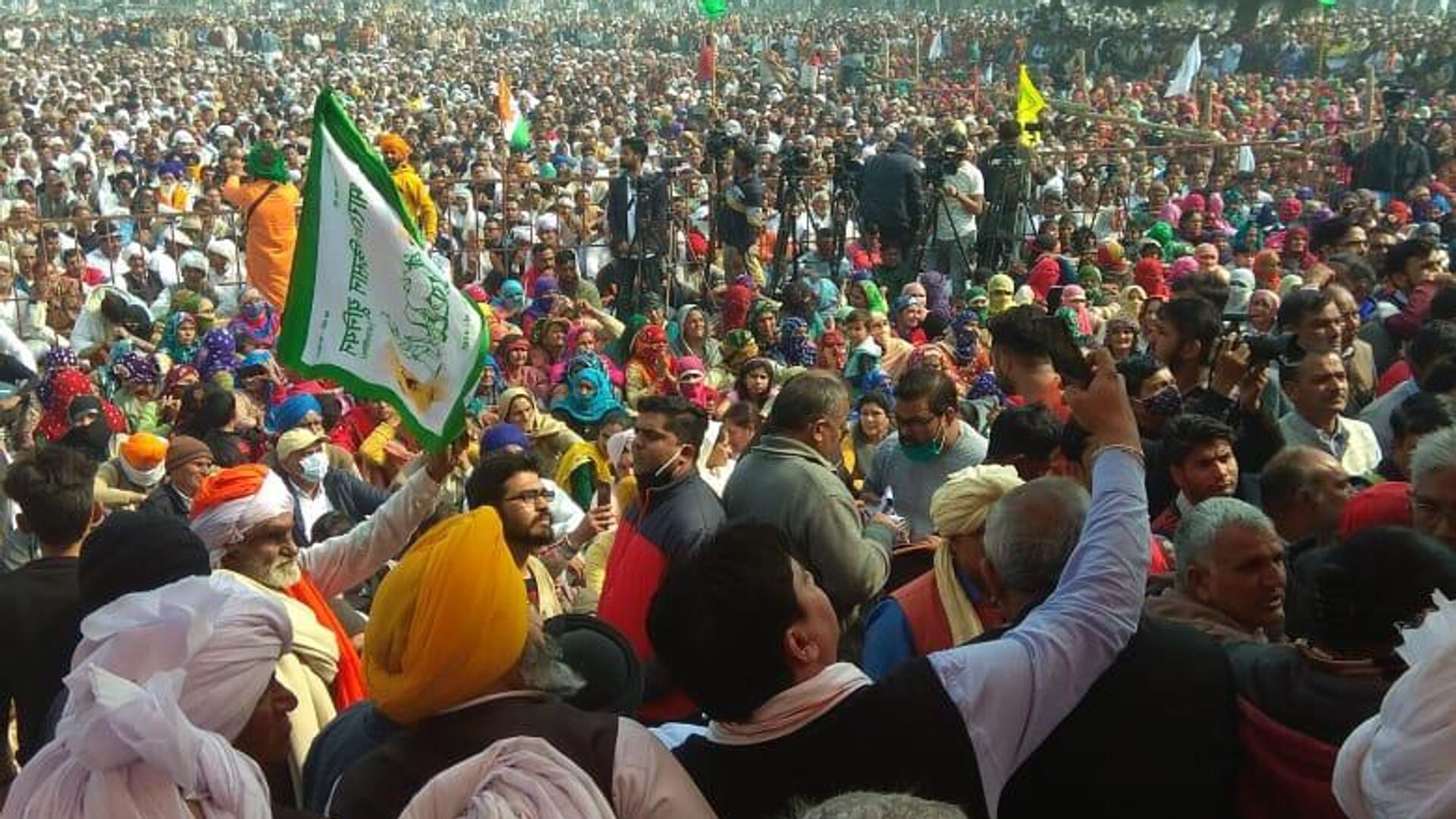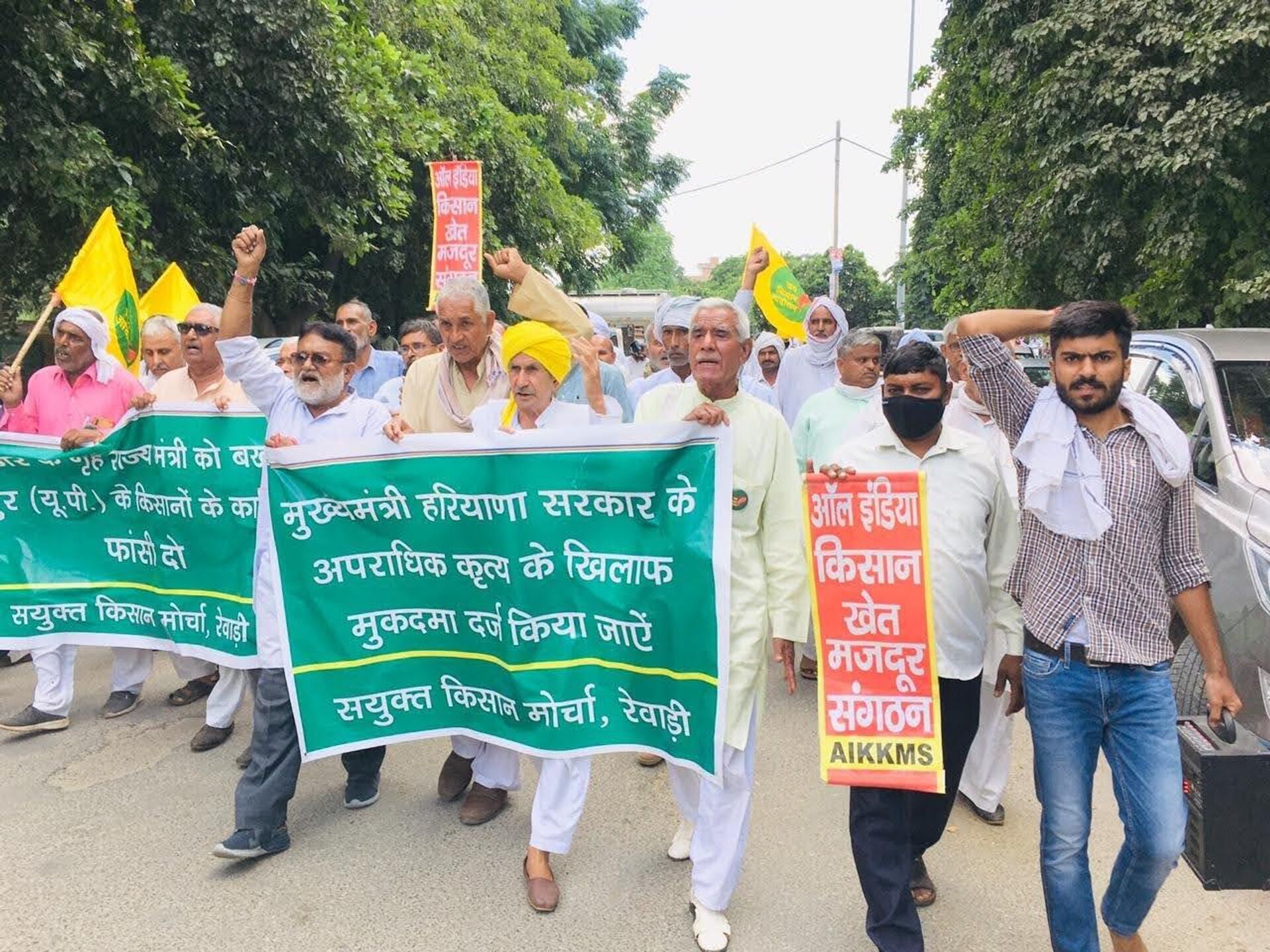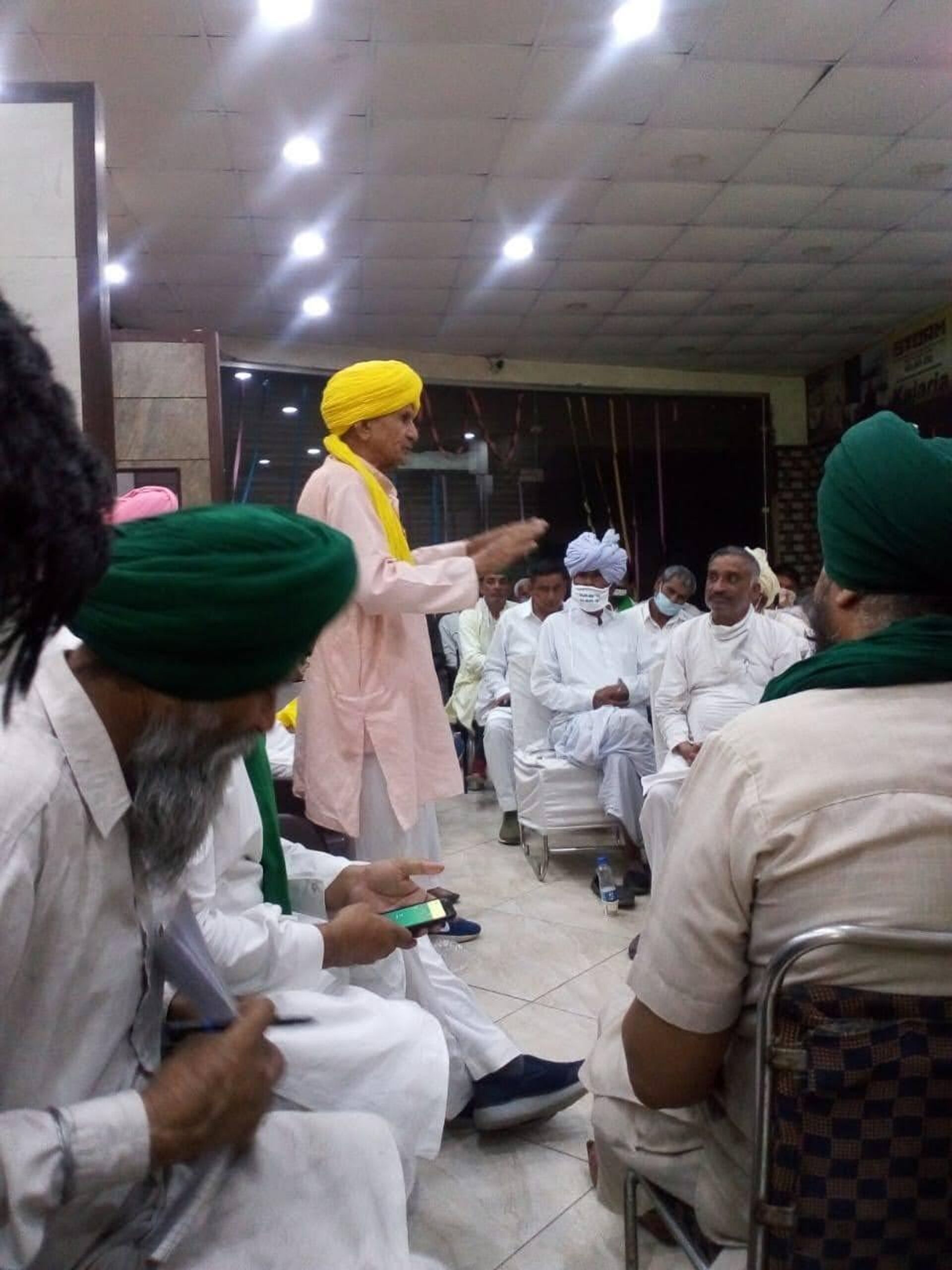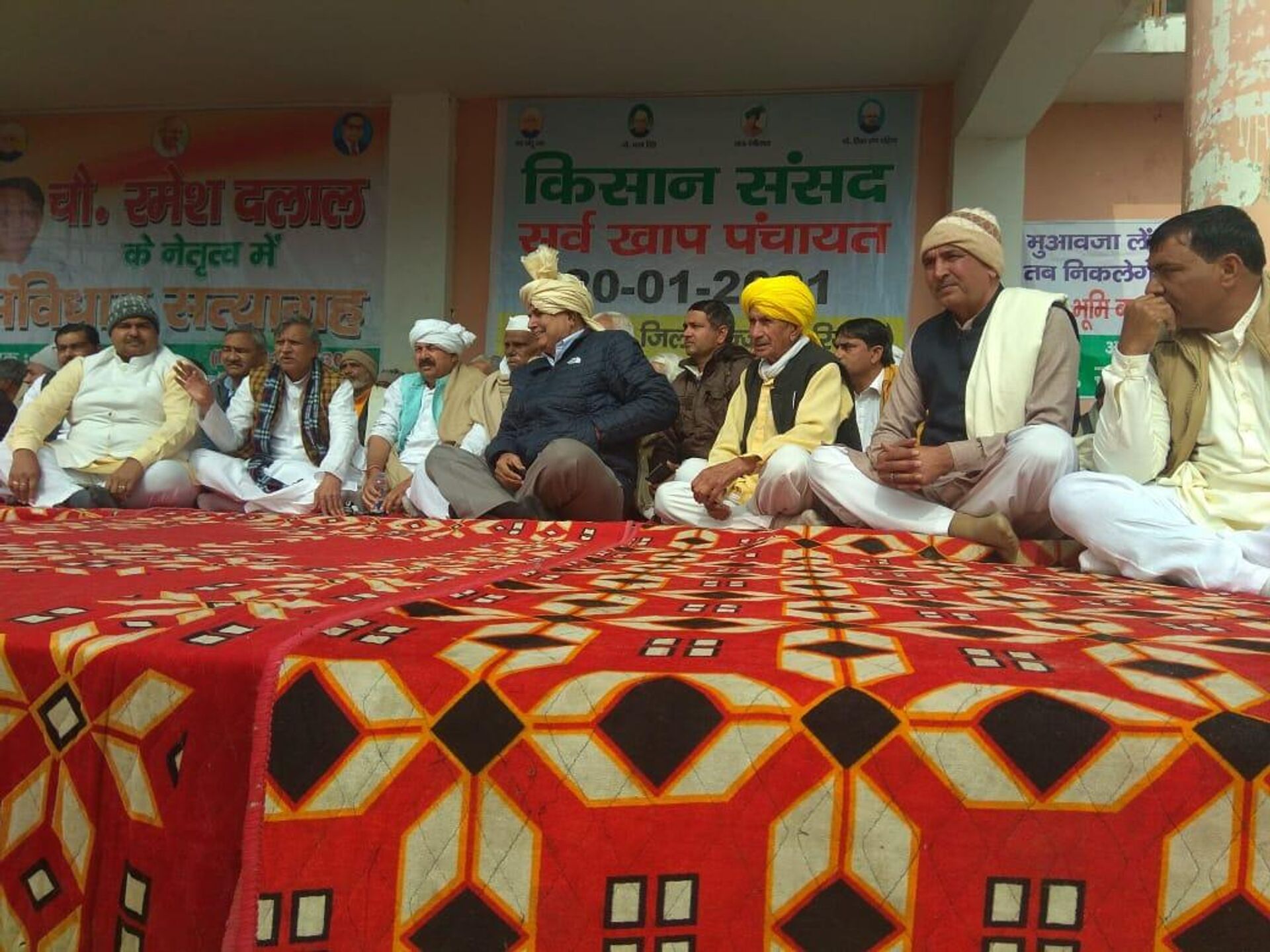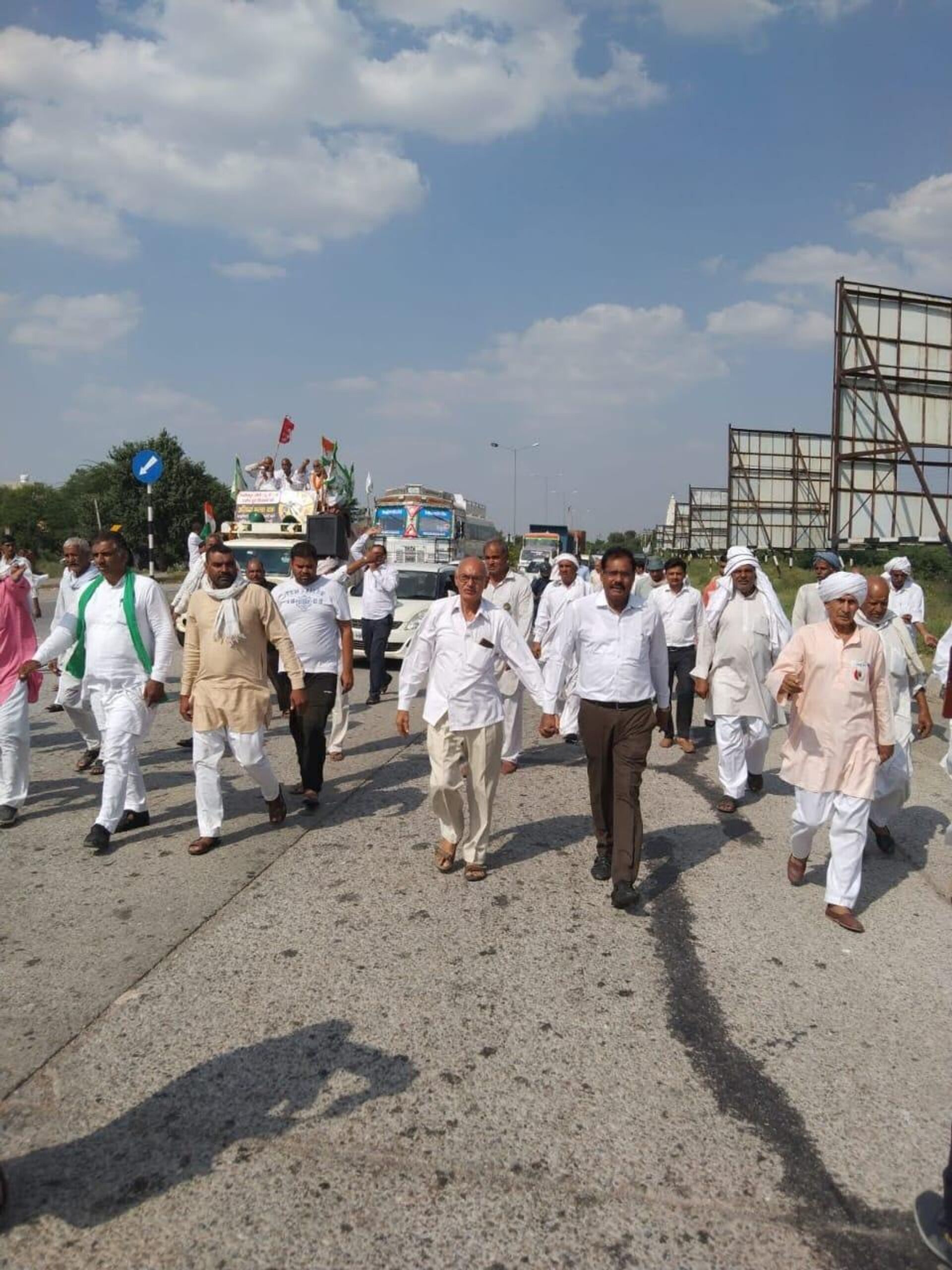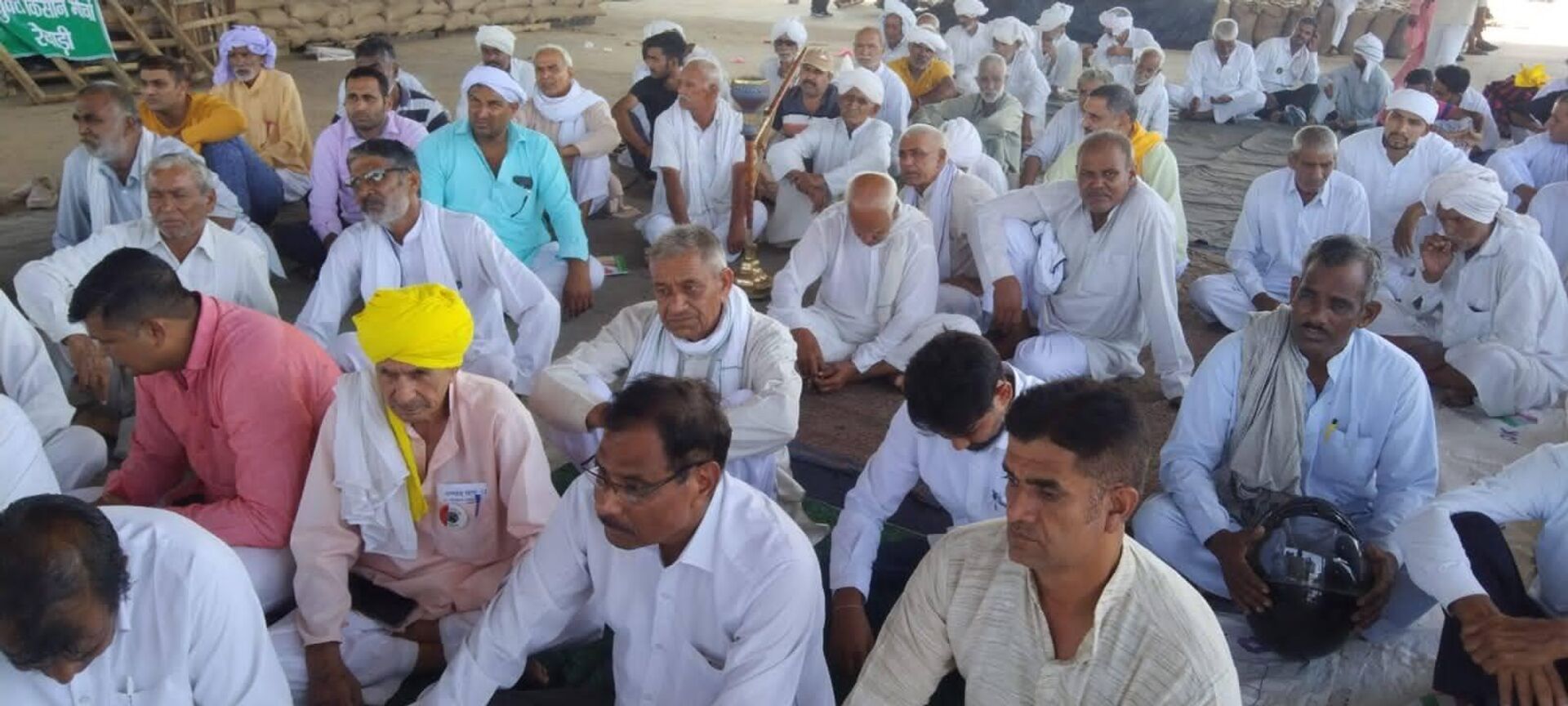https://sputniknews.in/20230515/how-khaps-shape-northern-indias-rural-social--political-narratives-1961490.html
How Khaps Shape Northern India's Rural Social & Political Narratives
How Khaps Shape Northern India's Rural Social & Political Narratives
Sputnik India
Having initially emerged to resolve social strife among villagers, the Khaps today hold enormous clout. They can transform a social narrative, while impacting... 15.05.2023, Sputnik India
2023-05-15T16:30+0530
2023-05-15T16:30+0530
2023-05-16T16:33+0530
india
sit-in protest
protests
rural india
political crisis
aging society
social uplifment
indian farmers
village defence guards (vdg)
sputnik exclusives
https://cdn1.img.sputniknews.in/img/07e7/05/0f/1972310_0:301:780:740_1920x0_80_0_0_8b60a098b9b90d4fffe60adebc94b2ac.jpg
The Khaps -- community groups representing a clan or dominant castes -- exist as an unofficial body of village councils 'Panchayats' in northern India. Though they view themselves as an inalienable part of rural life, they have been called ‘Kangaroo courts’.Of late, the Khaps have emerged in the spotlight as a pressure group capable of bringing down government machinery through months-long sit-ins.Be it the 2020 Farm Laws protest, the 2016 Jat Community Reservation agitations, the 2022 Army Recruitment drive 'Agniveer' protests, or the current women wrestlers' protest to unseat their chief and five-time BJP parliamentarian over sexual harassment allegations -- the Khaps' entry to any scene has dramatically upped the ante against the government.Sputnik tried to dig deeper into the Khaps' worldview in terms of their latent objectives, functioning, financial sustenance, and rise as groups allegedly operating parallel governments along feudal lines in villages.Understanding KhapsBefore Indian Independence, the Khaps used to exist as a justice system. They would mediate to resolve issues during social strife over public properties or issues such as availability of water or cleanliness. And perhaps this role originated the concept of Panchayat (village council) in our democratic system, says Haryana's noted women rights activist Jagmati Sangwan.Jagmati, however, views Khap members as those who actually aspire to join the elected village or district-level councils, without indulging in developmental works or doing any social service (along with its official accountability). "However, they still manage to build political links. Such people use the Khap to achieve such objectives."Speaking about their influence, she says, these Khaps have turned into parallel platforms of officially elected village councils who, at times, violate individual democratic rights and issue mandatory edicts for villagers to abide by.She finds them to be "autocratic institutions", whose decisions put society's collective honour or tradition above an individuals' choices in life.But prominent Khap leader Om Prakash Dhankar of Haryana's Dhakla Village disagrees with this notion.Terming the Indian Khaps as "similar to Social Jury Bodies found in the USA or EU countries", Dhankar simplifies them as "a rural form of India's urban Resident Welfare Associations (RWAs)".He stresses that although Khaps trace their existence back to even earlier times, they were recognised as a Social Jury in the legal system of 'Rajshahi' (monarchy) ushered in during Emperor Harshavardhana’s time in 643 AD in northern India, and a few hamlets were accorded the leadership of Khaps. Since then, any Khap's authority can be inherited by only the same hamlet or village.Generally, when there's a need to discuss some major issue, neighboring villages are invited to any meeting as participants by that leading village. If further gatherings are required, 'Sarv Khap Meet' or a higher level congregation of multiple Khaps -- is also held to resolve matters involving a large number of people or society at large. And, for all this, the Khap 'Chaudharies' (heads), who could be a farmer or a pensioner, use their personal savings during any event, the 73-year-old explained to Sputnik.According to Dhankar, the Khaps exist as a democratic system to serve different groups of people and the republic’s system. They aim to ensure societal security and justice for every individual in its fold.Inter-Caste MarriagesHe explains that Khaps consider a village as a joint family. “We just emphasise not marrying a person of the same blood (maternal or paternal side) or of the same village or the same ‘Gotra’ (family origin). Aside from that, marry anyone… We wish to prevent any step that flouts our cultural or social norms.”However, Jagmati alleges that in inter-caste marriages, usually, it doesn't bother Khaps if an upper-caste man weds a lower-caste girl. But if he is a lower caste man and weds an upper caste girl, a local Khap may issue an edict to nullify such a marraige. Khaps socially boycott non-compliant families and even those who favor such families. At times, the Khaps blacken the faces of the families and publicly shame them over tarnishing the village's reputation in the region, Jagmati notes.Khaps and PoliticsRegarding allegedly manipulating social authority for personally-vested interests and that Khaps are gradually going down the path of politicization, Jagmati agrees that with time there's been a steady politicization of the Khaps.Jagmati views the Khaps as "hegemonic sections of society" upon whom political parties rely for favours during elections.Will Khaps Oppose the Modi Gov't in 2024?Calling themselves mere social groups, Dhankar states Khaps never intend to show any government down. But he wishes the central government do more for the villages and eagerly seeks that government officials attend Khap meetings."The government hoodwinks villagers by setting up committees just to postpone any matter. Like the revocation of the farm laws in 2021 while setting up committees that haven’t solved farmers' concerns. They rather intend to divide Khaps or replace its leaders," Dhankar alleges.Jagmati, however, believes showing up during popular protests or hot-button issues does translate to “an opportunity for free publicity”.Role in SocietyThough the Khaps often raise their voices over social issues like dowries, wedding extravagance, and drug addiction, Jagmati contends that "the real objective is to gain social legitimacy”.After three decades of social work, Jagmati finds the Khaps to be hegemonic sections of society. "They wish to keep these things alive or relevant to maintain their personal hold on those areas of socio-economic life."Describing them as “status-quo forces”, Jagmati maintains that they dislike democracy.How Khaps Use Their CloutGiven that the Khaps are hegemonic and influential at the socio-economic level, consequently in state structures, such as the judiciary and executive branches, most of the time, their kids are at the helm of affairs. So, Khap members indirectly influence the local administrative system through them, Jagmati explains.She comments that instead of following the law as per its intended spirit, at times such Khaps accommodate well-off or influential people and use the law in their favor.Touching on the Khaps' critical role as game changers in elections, she says that none of the parties speak out against the law-violating Khap edicts. They remember that ultimately, the Khaps' backing is crucial for sailing through any election.
india
rural india
Sputnik India
feedback.hindi@sputniknews.com
+74956456601
MIA „Rossiya Segodnya“
2023
Sandeep Datta
https://cdn1.img.sputniknews.in/img/07e7/04/07/1468069_0:258:1800:2058_100x100_80_0_0_3909870b82375b0693e9fd27915facc3.jpg
Sandeep Datta
https://cdn1.img.sputniknews.in/img/07e7/04/07/1468069_0:258:1800:2058_100x100_80_0_0_3909870b82375b0693e9fd27915facc3.jpg
News
en_IN
Sputnik India
feedback.hindi@sputniknews.com
+74956456601
MIA „Rossiya Segodnya“
Sputnik India
feedback.hindi@sputniknews.com
+74956456601
MIA „Rossiya Segodnya“
Sandeep Datta
https://cdn1.img.sputniknews.in/img/07e7/04/07/1468069_0:258:1800:2058_100x100_80_0_0_3909870b82375b0693e9fd27915facc3.jpg
jat community reservation agitations, kangaroo courts, community groups representing a clan, unofficial body of village councils, 2020 farm laws protest, women wrestlers' protest, social jury bodies, paris communes, khaps, who are khaps in india,
jat community reservation agitations, kangaroo courts, community groups representing a clan, unofficial body of village councils, 2020 farm laws protest, women wrestlers' protest, social jury bodies, paris communes, khaps, who are khaps in india,
How Khaps Shape Northern India's Rural Social & Political Narratives
16:30 15.05.2023 (Updated: 16:33 16.05.2023) Exclusive
Having initially emerged to resolve social strife among villagers, the Khaps today hold enormous clout. They can transform a social narrative, while impacting political fortunes in states like Haryana, Uttar Pradesh, and parts of Rajasthan.
The Khaps -- community groups representing a clan or dominant castes -- exist as an unofficial body of village councils 'Panchayats' in northern India. Though they view themselves as an inalienable part of rural life, they have been called ‘Kangaroo courts’.
Of late, the Khaps have emerged in the spotlight as a pressure group capable of bringing down government machinery through months-long sit-ins.
Be it the 2020 Farm Laws protest, the 2016 Jat Community Reservation agitations, the 2022 Army Recruitment drive 'Agniveer' protests, or the current women wrestlers' protest to unseat their chief and five-time BJP parliamentarian over sexual harassment allegations -- the Khaps' entry to any scene has dramatically upped the ante against the government.
Sputnik tried to dig deeper into the Khaps' worldview in terms of their latent objectives, functioning, financial sustenance, and rise as groups allegedly operating parallel governments along feudal lines in villages.
Before Indian Independence, the Khaps used to exist as a justice system. They would mediate to resolve issues during social strife over public properties or issues such as availability of water or cleanliness. And perhaps this role originated the concept of Panchayat (village council) in our democratic system, says Haryana's noted women rights activist Jagmati Sangwan.
“Today, an elected Panchayat (official village council) performs the works originally handled by Khap groups or, the unelected council of village elders. But some people continue to carry on with their inherited influence, just like it had existed in ancient times, as Khap Panhchayats, to safeguard their original social and cultural environment.”
Jagmati, however, views Khap members as those who actually aspire to join the elected village or district-level councils, without indulging in developmental works or doing any social service (along with its official accountability). "However, they still manage to build political links. Such people use the Khap to achieve such objectives."
Speaking about their influence, she says, these Khaps have turned into parallel platforms of officially elected village councils who, at times, violate individual democratic rights and issue mandatory edicts for villagers to abide by.
She finds them to be "autocratic institutions", whose decisions put society's collective honour or tradition above an individuals' choices in life.
Highlighting Khaps as "unelected groups", Jagmati says, their baton of leadership keeps changing on a generational basis. And, mostly socially and economically influential people try to run or mold society through such groups for personally-vested interests.
But prominent Khap leader Om Prakash Dhankar of Haryana's Dhakla Village disagrees with this notion.
Terming the Indian Khaps as "similar to Social Jury Bodies found in the USA or EU countries", Dhankar simplifies them as "a rural form of India's urban Resident Welfare Associations (RWAs)".
He stresses that although Khaps trace their existence back to even earlier times, they were recognised as a Social Jury in the legal system of 'Rajshahi' (monarchy) ushered in during Emperor Harshavardhana’s time in 643 AD in northern India, and a few hamlets were accorded the leadership of Khaps. Since then, any Khap's authority can be inherited by only the same hamlet or village.
Generally, when there's a need to discuss some major issue, neighboring villages are invited to any meeting as participants by that leading village. If further gatherings are required, 'Sarv Khap Meet' or a higher level congregation of multiple Khaps -- is also held to resolve matters involving a large number of people or society at large. And, for all this, the Khap 'Chaudharies' (heads), who could be a farmer or a pensioner, use their personal savings during any event, the 73-year-old explained to Sputnik.
According to Dhankar, the Khaps exist as a democratic system to serve different groups of people and the republic’s system. They aim to ensure societal security and justice for every individual in its fold.
He says: "This Khaps system has prevailed for ages, and it's on record since 643 AD, that's way before the Paris Communes (that consisted of 144 delegates elected by the 60 divisions of the city) were founded in France in 1789 AD. Both are similar systems in their core concept and philosophy."
He explains that Khaps consider a village as a joint family. “We just emphasise not marrying a person of the same blood (maternal or paternal side) or of the same village or the same ‘Gotra’ (family origin). Aside from that, marry anyone… We wish to prevent any step that flouts our cultural or social norms.”
However, Jagmati alleges that in inter-caste marriages, usually, it doesn't bother Khaps if an upper-caste man weds a lower-caste girl. But if he is a lower caste man and weds an upper caste girl, a local Khap may issue an edict to nullify such a marraige.
She explains: "The concern is the possibility of the girl's share in her father's property eventually being usurped by her lower-caste husband. The aim is to prevent the possibility of land ownership shifting to a lower-caste man.”
Khaps socially boycott non-compliant families and even those who favor such families. At times, the Khaps blacken the faces of the families and publicly shame them over tarnishing the village's reputation in the region, Jagmati notes.
Regarding allegedly manipulating social authority for personally-vested interests and that Khaps are gradually going down the path of politicization, Jagmati agrees that with time there's been a steady politicization of the Khaps.
"Due to being a group of many village councils (Panchayats), a Khap can have varying sections favoring different or opposing political parties. Thus, there can be divisions among Khap groups on political lines," she adds.
Jagmati views the Khaps as "hegemonic sections of society" upon whom political parties rely for favours during elections.
Will Khaps Oppose the Modi Gov't in 2024?
Calling themselves mere social groups, Dhankar states Khaps never intend to show any government down. But he wishes the central government do more for the villages and eagerly seeks that government officials attend Khap meetings.
"The government hoodwinks villagers by setting up committees just to postpone any matter. Like the revocation of the farm laws in 2021 while setting up committees that haven’t solved farmers' concerns. They rather intend to divide Khaps or replace its leaders," Dhankar alleges.
Focusing on the Khaps' intervention in the
Delhi Wrestling Protest, he noted that they entered the scene after the women wrestlers sought help. "Following our intervention, popular leaders like Rakesh Tikait of the reputable farmer protests also appeared on the scene. Thus, we heard our daughters' appeal and we are helping."
Jagmati, however, believes showing up during popular protests or hot-button issues does translate to “an opportunity for free publicity”.
Though the Khaps often raise their voices over social issues like dowries, wedding extravagance, and drug addiction, Jagmati contends that "the real objective is to gain social legitimacy”.
After three decades of social work, Jagmati finds the Khaps to be hegemonic sections of society. "They wish to keep these things alive or relevant to maintain their personal hold on those areas of socio-economic life."
Describing them as “status-quo forces”, Jagmati maintains that they dislike democracy.
How Khaps Use Their Clout
Given that the Khaps are hegemonic and influential at the socio-economic level, consequently in state structures, such as the judiciary and executive branches, most of the time, their kids are at the helm of affairs. So, Khap members indirectly influence the local administrative system through them, Jagmati explains.
She comments that instead of following the law as per its intended spirit, at times such Khaps accommodate well-off or influential people and use the law in their favor.
"On the one hand, the bureaucracy gets controlled by or for them, on the other hand, the government or political leadership depends on the Khaps for their vote considerations. This is how they manage to influence the entire official machinery."
Touching on the Khaps' critical role as game changers in elections, she says that none of the parties speak out against the law-violating Khap edicts. They remember that ultimately, the Khaps' backing is crucial for sailing through any election.
